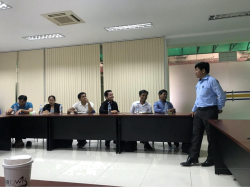
The WHO CC UTS acknowledges use of key language from The WHO Global Strategic Directions for Nursing and Midwifery (2021–2025).
Effective leadership and strategic planning are only possible once good governance, regulation, education and association are well integrated into a health system. In order to engage in policy making and strategic planning, nurses and midwives require a high level of leadership both within their own countries and also internationally [1]. While Cambodian nurses are able to earn more money working in other parts of the world, Virya Koi has remained committed to improving the health sector in his homeland.
Koi wears a number of hats. He’s Deputy Director of Health Services at the Ministry of Health in Cambodia. He’s also President and Chief Nursing and Midwifery Officer at the Cambodian Council of Nurses. He’s doing post-doctoral research out of Chulalongkorn University in Bangkok, Thailand. Currently based in Phnom Penh, Koi develops new policy and standards focused on nursing and midwifery practice.
Koi is leading policy improvements around changing nursing shifts in Cambodia from 24 hours to 12. Koi believes the new regime could lead to many benefits, including less exhausted nurses and fewer mistakes when it comes to administering medication. He says it would also be more practical. "We don’t need to recruit more nurses and we can save money", he says. As part of his post-doctoral work into the issue, he held three focus groups with Cambodian Intensive Care Unit (ICU) nurses.
“They cannot sleep, they are stressed, they are exhausted and have traffic accidents,”
he says. As a result, patients complain as they are not satisfied with their care. There are also issues with patient safety.
Koi recalls his own gruelling days working 24-hour shifts, sometimes 48, as it could often take a long time to save a life. “After work, you automatically collapse because your energy is completely finished,” he says. While the Ministry of Health has endorsed the change, hospitals are yet to take it up.
I hope I can be helpful in terms of innovation from 24 hour to 12 hour shifts but I need to prove it with the statistics.
Koi has been a nurse since 1989. He began his career in provincial operating theatres, working with a team from Switzerland. He later worked in ICUs. Since 2004, he has been at the Cambodian Ministry of health in a variety of roles.
In 2013, he began his nursing PhD at Chulalongkorn University and subsequently developed his new ‘Cambodian nursing care quality scale’, which is now being used by a Japanese doctor and student doing a Cambodian study. Koi is also in the process of trying to implementing a new standard of nursing practice. He is doing this with the support of Family Health international and Professor Richard Henker at the University of Pittsburgh in the United States. He says before they implement the standards, they need to assess which areas the nursing population are weak in. “We can prepare any programme or training,” he says.
Koi has been inspired to further his studies and help his community after travelling and working in different Asian countries.
I realised if I studied more I could improve my profession,” he says. “I hope the knowledge that I have brought from other countries can help and that I can share it with my colleagues in Cambodia.
[1] World Health Organization, World Health Organization 2019b Governance. 2019.

